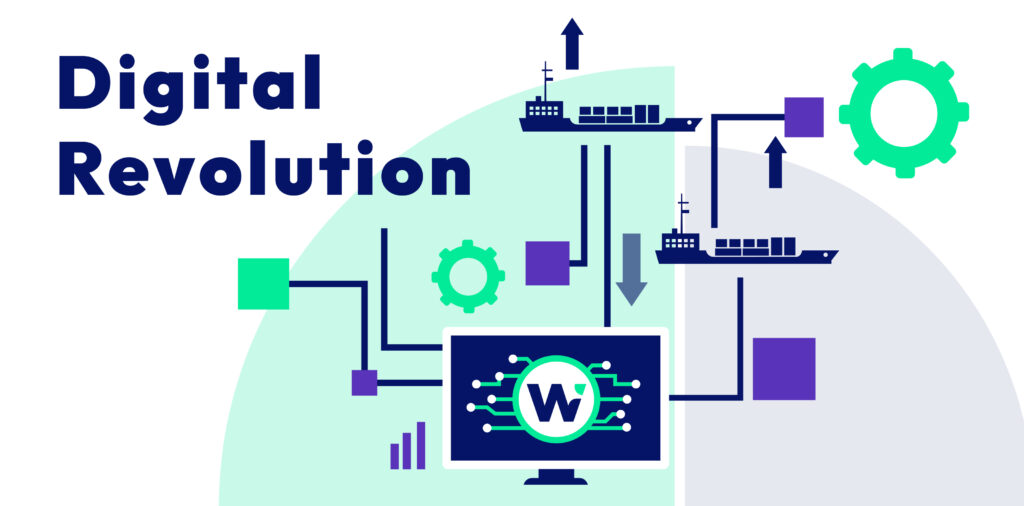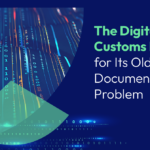In an era where industries seamlessly embrace the digital revolution, the maritime sector is at a pivotal crossroads, held back by antiquated paper-based trade documentation management practices. As technology propels us into the future, this post delves into the pressing reasons why now is the time for the maritime industry to break free from traditional methods and embrace digital solutions.
In this post, we will explore the digital shift, explaining the inefficiencies, delays, costs, and risks embedded deeply in traditional paper trading. This change isn’t only about innovation; it’s a call to the maritime industry to navigate trade with efficiency and resilience.
We will also discuss how WaveBL, a leading digital trade documentation management solution harnessing blockchain for secure document transmission, frees the maritime industry from the costs and constraints of paper-based trade. WaveBL propels the sector seamlessly towards a future marked by efficiency and security.
Challenges of Using Paper-Based Trade Documents
The maritime industry grapples with inefficiencies, delays, and substantial risks rooted in traditional paper trading, hindering visibility and adaptability across the supply chain.
Difficulties emerge in adapting to rapid market changes, impeding quick adjustments in strategies and supply chain logistics. Furthermore, shipping operations are significantly impacted, with ships arriving before the necessary paperwork, leading to increased demurrage costs.
Why make the shift now?
-
Immediate Decision-Making Needs: Delayed decision-making due to paper-based processes can result in missed opportunities, lost revenue, and eroded market competitiveness.
-
Risk of Operational Disruptions: The lack of real-time visibility and adaptability amplifies the risk of operational disruptions, leading to delayed shipments, unhappy customers, and increased costs.
-
Competitive Landscape Dynamics: Businesses that fail to adapt to the rapid changes in the digital age risk being left behind by competitors leveraging advanced, digitized processes.
Digital Advantages: Enhanced Security, Risk Management, and Commercial Benefits
Digital solutions shield the maritime industry from significant security risks associated with paper-based trade documents. Physical documents, prone to loss and damage during transit, can compromise crucial trade information and lead to operational setbacks. In contrast, the digital approach prevents such losses, ensuring the integrity of sensitive information.
Positives of Electronic Trade Documents
-
Enhanced Security Measures: Digital methods actively eliminate vulnerabilities, providing a proactive defense against potential loss, damage, and unauthorized access to trade documents. This robust security foundation guarantees the confidentiality of critical data.
-
Cost Savings: The shift to electronic trade documents not only fortifies security but also delivers substantial cost savings across the supply chain. By eliminating the need for physical storage, printing, and courier services, businesses contribute to a more efficient and economical trade environment.
-
Efficiency Maximization: Utilizing a single digital file throughout the trade process, from negotiation to the invoice, minimizes the need for re-typing. This streamlined process not only reduces the potential for errors but also fosters efficiency gains throughout the entire trade workflow.
The digital transition isn’t solely about security; it represents a transformative pathway to a more secure, cost-effective, and streamlined future. Embracing digital solutions in the maritime industry is not merely an upgrade—it’s a strategic shift toward a more resilient and competitive trade landscape.
Global Impact and Sustainability
The repercussions of widespread paper-based trade documents extend far beyond individual businesses, profoundly impacting global supply chain efficiency, trade costs, and environmental sustainability.
Global Implications of Widespread Paper Trading
-
Environmental Footprint: The maritime industry alone contributes 32 million tonnes of A4 paper annually, significantly contributing to carbon emissions. The paper production process, transportation, and disposal collectively create an unsustainable environmental footprint.
-
Trade Costs: The inefficiencies inherent in paper trading escalate trade costs on a global scale. The need for physical documentation involves substantial expenses related to printing, courier services, and storage.
Impact of Switching to Digital Trade Documentation Management
-
CO2 Reduction Potential: Transitioning to electronic trade documents has the potential to significantly reduce the industry’s carbon footprint. Moving away from physical documentation not only mitigates the environmental impact of paper production but also substantially reduces CO2 emissions tied to transportation, fostering a more sustainable future.
-
Cost Savings and Efficiency Gains: Transitioning to electronic trade documents delivers numerous benefits. The shift reduces demurrage fees, streamlines processes, and ensures overall cost savings, creating a more sustainable and cost-efficient trade environment. Beyond environmental advantages, this transformation significantly enhances efficiency across the supply chain. The result is lowered operational costs, contributing to the heightened competitiveness of the maritime industry in the digital age.
A Comprehensive Shift
The outcome is not just a reduction in environmental impact but also substantial cost savings and efficiency enhancements across the supply chain, making the maritime industry more competitive in the digital age.
WaveBL: Leading the Digital Transformation
In response to the challenges deeply rooted in traditional paper trading, WaveBL not only addresses these challenges but offers a comprehensive solution that transforms trade documentation management.
Features and Benefits
-
Efficiency Enhancement: Offers a streamlined digital solution that reduces manual paperwork and accelerates the trade process. WaveBL’s implementation shortens document transmission to under 10 minutes, enhancing overall operational efficiency. This swift process enables businesses to navigate the trade landscape with agility, responding promptly to market dynamics.
-
Security and Risk Management: Leveraging the power of blockchain, WaveBL establishes an unchangeable and traceable system for every trade document submission, ensuring transparency, traceability, and anonymity. This transformative measure eliminates the risk of fraud or unauthorized alterations, safeguarding the integrity of trade documents. The blockchain-based system provides a comprehensive audit trail, enhancing accountability and significantly reducing the risk of fraudulent activities within the trade process.
-
Commercial Benefits: Beyond efficiency and security, WaveBL brings substantial commercial benefits to the table. Adopting WaveBL significantly reduces costs associated with printing, courier services, and demurrage fees. The reduction in physical paperwork not only saves on printing costs but also eliminates the need for courier services, contributing to a more cost-efficient trade environment.
Ensuring a Seamless Transition
Navigating the evolving digital age demands a solution that not only addresses current challenges but also provides a pathway for future growth. WaveBL stands out by offering scalability, designed to evolve seamlessly with the needs of businesses. Its user-friendly interface makes it accessible to businesses of all sizes, fostering widespread adoption across the industry.
Role of BlockChain Technology
In addition to its innovative features, WaveBL distinguishes itself by leveraging blockchain technology for secure document transmission. Blockchain ensures the immutability of transactions and provides a transparent and traceable record, enhancing the security of trade documents.
The future demands adaptability, and WaveBL is designed with the evolving needs of businesses in mind. Seamlessly transitioning into a fully digitalized trade documentation management environment, it’s more than just a solution; it’s a pathway to future growth.
It’s your guide to a future marked by efficiency, security, and success. Explore how WaveBL can propel your maritime trade into this future – sign up for updates or contact us for a deeper dive.
How will you navigate the waves of change in maritime trade? The answer is clear – in the digital revolution, WaveBL is your compass.



